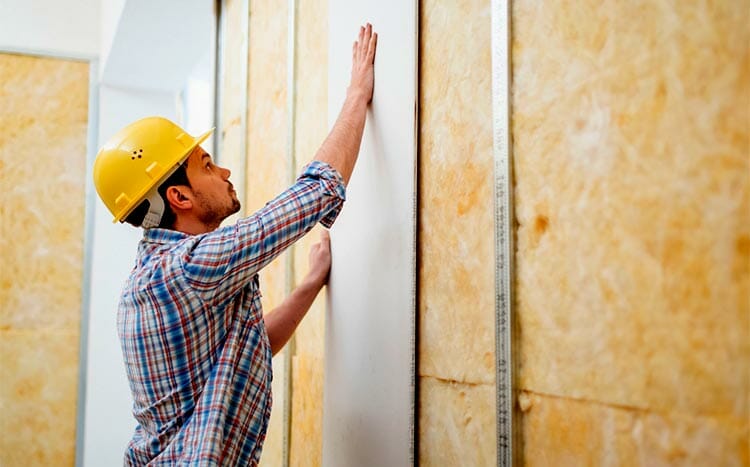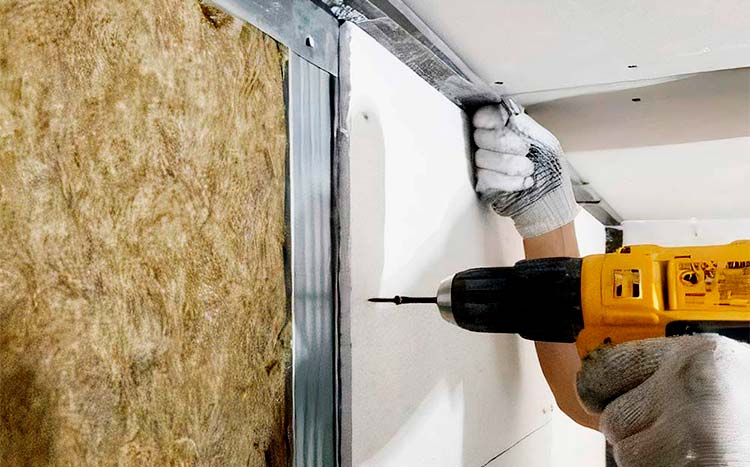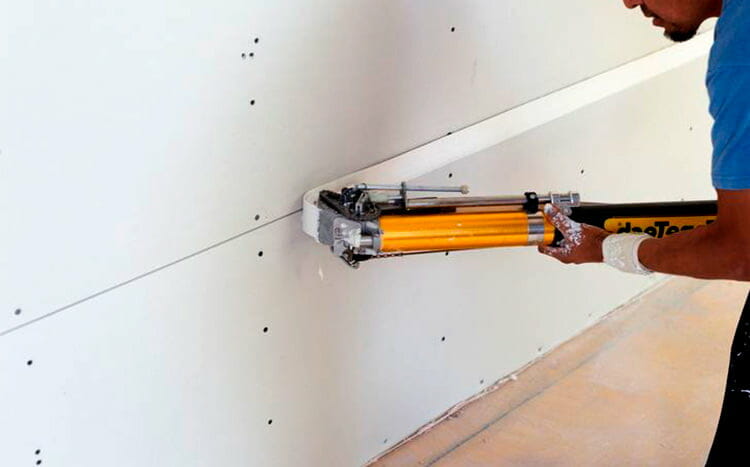Drywall is extensively utilized in the construction of walls and ceilings in both homes and businesses. Its popularity among many is due to its cost-effectiveness and dependability.
The cost to finish drywall is between $1 and $1.65 per square foot. The actual cost to finish drywall depends on the type of finish, the complexity of the job, and the room’s size.
Installing drywall cost starts from $1per square foot, but finishing drywall will cost more.
What we cover
ToggleAverage cost of drywall finishing
| Finishing Drywall Level | Description | Low | High |
|---|---|---|---|
| Level 0 | Temporary - No taping or finishing. Drywall only | $1 | $1.50 |
| Level 1 | Tapped joints and a single coat | $1.25 | $1.75 |
| Level 2 | Tapped & double coat over all joints | $1.50 | $2 |
| Level 3 | Tape embedded in joint compound & 2nd coat | $1.75 | $2.25 |
| Level 4 | Embedded tape and 2 additional layers of compound | $2 | $2.50 |
| Level 5 | Level 4 plus thin skim coat applied to the entire surface | $2.25 | $3 |
| Drywall finishing | Per square foot (Avg) | $1 | $1.65 |
| Drywall finishing per room (10 x 12) | 10 x 12 room | $120 | $200 |
| Finishing labor cost | Per hour | $50 | $100 |
| Finishing job supplies | Level 5 - 12 x 12 room | $5 | $7 |
Drywall finishing per square foot
The average cost to finish drywall per square foot is approximately $1 to $1.65. This cost is for the finishing process alone, and it can be lower or higher depending on the level of finish, the complexity of the job, and the size of the room.
Finish levels range from level 0, which is the lowest, and level 5 is the highest level of finish. The cost range to finish level 0 is $1 – $1.50 while finishing level 5 is about $2.25 – $3. To know the actual cost of the project, determine which level you want first. This way, you will be able to create a reliable budget.
Levels of Drywall finishing
Level 0: this level is usually for temporary construction. It is also used when homeowners have not decided on the finish level, and it costs about $1 to $1.50 per square foot for the job.
Level 1: this level is usually used in areas hidden from public views like attics, corridors, and smoke barrier applications. It involves adding tape to seal the seams then adding mud to cover the tape. This finish level costs about $1.25 to $1.75 per square foot.
Level 2: ideally used in garages, warehouses, or as a substrate for tiling. One coat of compound is usually added to the tiles, and it costs about $1.50 to $2 per square foot for the job.
Level 3: This level costs about $1.75 to $2.25 per square foot. Two joint compound coats are usually applied, making the surface ready for medium texturing, whether by hand or spray before painting.
Level 4: level 4 involves applying 3 coats of joint compound, and it is ideal for wall coverings, light textures, and flat paints. The price for this finish level is about $2 to $2.50 per square foot.
Level 5: this level is the most effective for smooth wall designs and uniform surfaces. It prevents fasteners and joint photographing from showing through the drywall surface. This level costs approximately 2.25 to $3 per square foot.

Cost to tape drywall joints
The national average cost to tape drywall joints is approximately $0.05 per linear foot. The range for this project is about 0.04 to $0.05. The total cost for materials and labor is about $0.91 per linear foot, with a range of $0.83 to $1 per linear foot.
| Cost to tape drywall joints | ||
|---|---|---|
| National Average per linear foot | 1 foot | $1.05 |
| Cost for labor | 1 hour | $40 |
| Average for 500 linear feet | 500 feet | $425 |
Cost to hang and finish drywall
The average cost to hang and finish drywall is about $2, coming in between $1 and $3 per square foot. The whole project’s average cost is about $1,843, with a range of $1,020 and $2,876.
The cost to hang drywall per square foot is approximately $1 to $1.50 while finishing ranges from $0.50 on the low end and $1.65 on the high end.
Cost to finish a basement
The cost to finish a basement is approximately $18,400 on average. The price can be as low as $2,800 and as high as $34,000, depending on the basement’s size and finish level. This translates into $15 per square foot with a range of $7 and $23 per square foot.
Finishing your basement walls, floors and ceiling gives you an ROI of up to 75% when you sell the house. It also increases the home’s resale value and helps in attracting more potential customers. Besides, it offers additional space to relax, offers extra room or storage space for your home.
Cost to finish a garage
A garage is also beneficial, and it helps declutter your home, create a home workshop or offer an alternative entryway to your house besides protecting your cars from the weather.
If your garage does not have a floor, wall, ceiling, or finishes, it can cost about $5,000 to $10,000 to finish a garage with drywall. This cost will, however, depend on the size of the garage and the level of finish.
Cost to finish a 10 x 12 room
The cost to finish a standard 10 x 12 room is approximately $120 to $200. The cost to install and finish drywall in a single room tends to be higher than installing and finishing the drywall in multiple rooms. So, you may feel that the rates are higher for one room than for several rooms.
Labor cost to finish drywall
Contractors charge about $50 to $100 per hour to install and finish drywall. However, most contractors price the jobs per square foot based on the number of hours the entire project is likely to take. Hourly rates tend to be more costly than fixed rates. That is why it is best to look for contractors offering fixed rates.
Drywall installation cost
The cost to install drywall will largely depend on the size of the job. The best way to price drywall installation is the hour. For the most part, the above prices include the supply of drywall sheets, the time taken to hang drywall, drywall mud, the tape drywall joints, and finally the cost to finish drywall.
If you are looking for a separate price for drywall installation, you can look at the cost per room or per hour unfinished.
| Service | Quantity | Low | High |
|---|---|---|---|
| Drywall Installation cost | 1 sq. ft. | $1 | $3 |
| Drywall install labor cost | Hr | $50 | $100 |
| Drywall job supplies | Per sheet | $10 | $20 |
| Cost to drywall a 10 x 12 room | 10 x 12 | $120 | $360 |
| Cost to drywall 2 rooms | 10 x 12 each | $240 | $720 |
| Cost to drywall 3 rooms | 10 x 12 each | $360 | $1080 |
| Cost to drywall 1500 sq. ft. house | 1500 sq. ft. | $2,250 | $3,000 |
Commercial drywall finishing cost
A commercial drywall installer is no different from residential drywall installation contractors, only they have better resources at their disposal to work on large spaces and square footage.
Installing and finishing drywall on a 30 ft. ceiling requires scaffolding and a drywall hoist to get the job done. Having access to this equipment is key to get the job done right.
Which thickness and type of drywall is right for me?
Your local drywall installer will be able to advise you on the right drywall for the job, but some things you do need to bear in mind are moisture and fire.
Fire-resistant drywall is used around fireplaces and in the kitchen near stoves and cooktops. This fire rate drywall will not catch fire under normal circumstances.
In bathrooms and showers, you will need moisture-resistant drywall known as green board. This will stop mols in its tracks.
Process of drywall finishing
All drywall projects start the same way, they just end at different points of finishing. Here is a brief rundown of what you can expect.
Hanging drywall sheets
Gypsum board or drywall sheets are hung with nails or screws butted up against each other.
Tape drywall joints starts
Where drywall panels are butted up against each other, joint tape is used to prepare for mud compound.
Drywall mud time
Contractors will then mud drywall to help create a seamless finish between boards. Screw holes are also filled in and any other nook or cranny.
Sanding
Sandpaper is used to remove excess drywall compound and crease a smooth surface ready for sanding. Depending on the total square footage of the room this is a fairly fast process as the drywall mud comes away quite easily.
All there is left to do is clean up the drywall dust and begin painting.
Professional Drywall Service vs. DIY cost
The following table shows the prices for DIY and professional drywall services.
| Level | Low | High | |
|---|---|---|---|
| DIY Finish Drywall | 4 | $0.50 | $0.75 |
| Pro Finishing Service | 4 | $1 | $1.65 |

DIY Cost
DIYing your drywall project can save costs by up to two-thirds of the total project. You will only have to buy the preferred drywall and all other required materials for the installation and finish the job. However, drywall is very heavy, and you may not be able to lift it on your own, and you may be forced to install it vertically.
The drywall cost per square foot is about $0.40 and $0.65 or $12 to $35 per panel, excluding other supplies. Although you may spend some money to buy other necessary installation materials, the overall DIY cost will still be lower than hiring a pro.
Supplies required
- Small ladder – $30
- Safety glasses – $10
- Face mask – $7
- Joint tape – $3 per roll
- Sanding blocks – $5
- Vacuum cleaner – $70
- Joint compound (mud) – $8 per box
- Flat trowel – $7
- Corner trowel – $12
- Drywall screws – $7 per box
Disadvantages of DIY
- Lack of enough experience
- Risk of accidents, injuries, and mistakes while handling the job
- The drywall panels are too heavy to be lifted by one person
- The project may last for a longer time
Professional Drywall Finishing Service
The average cost to finish drywall is about $1 to $1.65 per square foot. The total cost for the installation and finish of the drywall is about $1 to $3, with an average of $2 per square foot. This cost depends on the level of finish, the complexity of the project, and the room’s size, plus the height of the ceiling.
Although it is costlier to hire professionals to install and finish your walls and ceilings, you will have peace of mind knowing the job is in the hands of professionals. More so, the project will be handled within one to three days, depending on its size. If you want a professional finish, it is best to hire professionals to do the job for you.
Disadvantages of Pros
- Pros are quite expensive and may charge higher than the expected prices.
- They may not visualize what you really want.
- You will not have the freedom to run the project the way you want.
Cost to refinish drywall
The average cost to refinish drywall is about $0.39 per square foot, coming in between $0.37 and $0.42. The total price for materials and labor is about $2.21, with a range of $1.46 and $2.96.
To cut on the costs, you can do DIY repairs like filling in cracks and holes and then sanding the surface. You can buy a drywall repair kit that goes for about $10 to $30 for DIY repairs or hires a professional to repair and refinish your walls.
Commercial drywall finishing cost
Commercial drywall finishing is a little more expensive than residential due to the height of walls and ceilings. Scaffolding will be needed to finish drywall on 20-foot walls and ceilings. This takes more time and money, and you may have to pay an additional cost of 30-50% on the initial price.
If you need to add framing to the drywall, you can pay about $4 to $4.5 per square foot. This cost is inclusive of all materials. In addition, most commercial projects require heat/fire-resistant drywall, which goes for about $0.34 to $0.42 per square foot. For soundproof drywall, which is also prevalent in commercial buildings, you can pay about $0.95 to $2.25 per square foot.
Is painting included in the level 5 finishing price?
Painting is not included in the level 5 finishing price. In level five, all the level 4 steps are included, but an additional step, which is the addition of a layer of a skim coat of mud/joint compound, is included. This extra layer is intended for concealing imperfections to provide a smooth, flat surface.
FAQ's
What’s the easiest way to finish drywall?
To make your drywall finish process easy and fast, make sure you have the right tools ready. You will need a lightweight joint compound, mud pan, tape, sanding block, and a convenient drywall knife. Then, tape the joints using either mesh tape or paper tape. If you want to apply mud immediately after taping the joints, use mesh tape because it is self-adhesive and can be finished immediately.
Apply the three-swipe method to apply mud on the seam to make the sanding process easy and fast. This means you apply a lot of mud on the surface then wiping off the extra. This ensures the surface is smooth and easy to sand.
Do you sand between coats of drywall mud?
Yes, it is essential to sand between coats to minimize bumps while the mud is not completely dry to avoid sanding the mud later. You can also allow the first coat of compound to dry completely, then apply two more mud coats while sanding between the coats. This makes the job easier, and the finish becomes smoother.
Can you finish drywall without sanding?
Yes, you can finish drywall without sanding the surface by using a knife or rubber float to smooth the wall to make it look smooth. This way, you will not have to sand the surface, but you will spend more time handling the job properly.
Is it better to wet sand or dry sand drywall?
If you are sanding tight corners and small patches, wet sanding using a sponge is the best. This is because it becomes easier to work the sponge into the patches and corners. More so, it is easier to clean up after wet sanding because there will be less dust. However, for a more even, smooth and appealing finish, dry sanding is the way to go.
Is it ok to overlap drywall tape?
No, you should not overlap drywall tape. Applying one layer of drywall adhesive tape helps minimize swellings in the finished drywall surface. It is faster and simpler to apply a single layer for vertical joints. For horizontal joints, ensure you cut the tape to fit between the drywall’s vertical strips perfectly but do not overlap.
What grit sandpaper do you use?
Once the drywall is completely dry, you can sand it using 100 or 120 grit sandpaper. You can also use 150 or 220 grit sandpaper or a fine sanding sponge to sand and smooth the joint compound. This ensures the surface is smooth and has an appealing finish.
How long should drywall mud dry before sanding?
Drywall mud or joint compound should be allowed to dry for up to 24 hours between coats before you proceed to sanding, priming, or painting. This drying period ensures the mud is completely dry and makes it easier to sand and paint.














